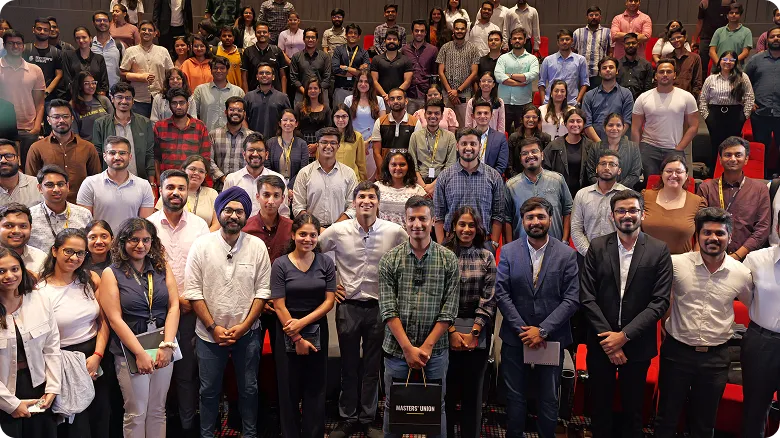Undergraduate
Undergraduate (Global)
Postgraduate
PGP in Technology and Business Management
PGP in Technology & Business Management
(Young Leaders Cohort)
PGP in Human Resources & Organisation Strategy
PGP in Sports Management & Gaming
PGP in Applied AI & Agentic Systems
PGP in UI/UX & Product Design
PGP in Sustainability & Business Management
PGP Bharat
Executive
Family Business
Careers
Innovations
Faculty
MU Ventures
Enterprise Education
Student Life
Jobs
Become a Master
events
For Companies
Blog
MBA
MBA Grads and the Startup Ecosystem: Should You Work for a Unicorn or Build Your Own?
March 24, 2025

For many MBA graduates, the decision after business school comes down to two exciting but drastically different paths - joining a high-growth startup (often a unicorn) or launching a venture from scratch.
Both options offer immense learning opportunities, financial rewards, and personal growth, but they come with their own set of challenges. Should you take the plunge and build your own startup or gain experience in a unicorn before going solo? Let’s break it down.
-
The Case for Joining a Unicorn: Learning from the Best
A unicorn - a startup valued at over $1 billion - is already past its early struggles and has demonstrated market validation, scalability, and investor confidence.
Pros of Joining a Unicorn
-
Structured Chaos: Unlike early-stage startups, unicorns have established processes while still being fast-moving and disruptive. This allows MBA grads to work in an exciting, high-growth environment while still having some stability.
-
Exposure to Rapid Scaling: Startups that have hit the unicorn mark are often expanding into new markets, launching new products, and securing mega funding rounds. Working in this environment exposes you to real-world business scaling strategies, a skill crucial for future entrepreneurs.
-
Access to Mentorship: At a unicorn, you’ll work alongside seasoned entrepreneurs, investors, and high-calibre leaders from diverse industries. Many startup founders cut their teeth at unicorns before launching their own ventures (e.g., Flipkart alums founded Udaan, Meesho, and PhonePe).
-
Financial Upside: Unicorns often offer employees equity (ESOPs), meaning if the company continues to grow or goes public, early employees can make millions.
-
Fundraising Advantage: Having a unicorn’s name on your resume can make investors more confident in your own startup later. VC firms often prefer to back founders who have previously worked at successful startups.
Cons of Joining a Unicorn
-
Less Autonomy: You won’t be calling all the shots like a founder. While you’ll still have responsibility, your decisions are subject to leadership approval.
-
Competitive Environment: Unicorns attract top-tier talent, which means higher expectations, longer hours, and intense pressure to perform.
-
Risk of Burnout: The speed and high-performance culture at unicorns can be exhausting. Some employees leave due to work-life balance concerns, especially if they don’t share the founder’s long-term vision.
-
The Case for Starting Your Own Business: The Founder’s Journey
Launching a startup right after your MBA is high-risk, high-reward. While 90% of startups fail, the ones that succeed create life-changing wealth and impact.
Pros of Starting Your Own Business
-
Complete Ownership: As a founder, you make all strategic decisions, from product development to fundraising and hiring. You dictate the company culture and vision.
-
Uncapped Upside: If your startup succeeds, the financial returns are far greater than working for someone else. Think about Paytm’s Vijay Shekhar Sharma (ex-MBA) or Ola’s Bhavish Aggarwal (IIT grad turned founder) - they built multi-billion-dollar companies instead of working for one.
-
Accelerated Learning: As a founder, you wear multiple hats - CEO, CFO, CMO, and HR head - all at once. Every decision directly impacts the company, making the learning curve steeper than at a unicorn.
-
Creating Real Impact: Many entrepreneurs launch startups to solve meaningful problems. Whether it’s Zerodha’s Nithin Kamath making investing accessible or Cure.fit’s Mukesh Bansal disrupting fitness, founders get the satisfaction of building something valuable.
-
Fundraising Opportunities for MBAs: Investors trust MBA grads, especially from top business schools. Y Combinator, Sequoia, and Accel actively scout MBA founders from Harvard, Stanford, ISB, and Masters’ Union.
Cons of Starting Your Own Business
-
High Failure Rate: Most startups don’t make it past the first three years. Founders face funding struggles, operational setbacks, and market risks.
-
Financial Uncertainty: Unlike a unicorn job that offers stable salaries and ESOPs, startup founders often don’t take a salary for years. If funding doesn’t come through, personal savings can run out quickly.
-
Mental and Emotional Pressure: Founders face immense stress—handling investors, employees, product failures, and financial crunches. It’s an emotional rollercoaster.
-
Longer Path to Success: While unicorn employees might see quick career acceleration, startup founders often take years before seeing success or even a stable income.
-
Real-Life Examples: Unicorn Alumni vs Founders
MBA Grads Who Founded Their Own Startups
-
Phanindra Sama (BITS Pilani MBA) – Founded RedBus after quitting his corporate job. Later sold to Goibibo for ₹800 crore.
-
Falguni Nayar (IIM Ahmedabad) – Built Nykaa from scratch and turned it into a ₹1 lakh crore IPO success.
-
Ritesh Agarwal – Skipped an MBA, built OYO, and scaled it to a billion-dollar valuation.
MBA Grads Who First Worked at Unicorns Before Founding Their Own
-
Vidit Aatrey (Meesho) – Ex-Flipkart employee who leveraged his experience to build a social commerce giant.
-
Kunal Shah (CRED) – Worked in startups before launching FreeCharge & CRED.
-
Deepinder Goyal (Zomato) – Worked at Bain before founding Zomato.
Many successful founders first gained industry insights at a unicorn before launching their own venture.
-
The Hybrid Approach: Best of Both Worlds?
Some MBA grads work at a unicorn for 2-3 years to:
- Gain real-world exposure
- Build industry connections
- Save capital
- Learn fundraising & scaling
Then, they launch their startup with a safety net. For instance, Vineeta Singh (MBA, IIM Ahmedabad) worked at Deutsche Bank before founding Sugar Cosmetics. She used her corporate experience to navigate startup challenges.
The Final Verdict: What’s Right for You?
Choose a Unicorn if you want structured growth and mentorship, prefer financial stability before launching a business, and want to understand scaling, fundraising, and operations first. On the other hand, start your own business if you have a solid idea and market demand, thrive in uncertainty and risk, and want full control over your career and vision.
There’s no one-size-fits-all answer. Some of the biggest founders in history never worked at a unicorn, while others used unicorn experience as a launchpad. What’s your take? Would you work at a unicorn first or dive straight into entrepreneurship?

















